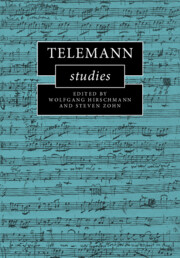Book contents
- Telemann Studies
- Cambridge Composer Studies
- Telemann Studies
- Copyright page
- Contents
- Figures
- Music Examples
- Tables
- Appendices
- Contributors
- Preface
- Abbreviations
- Part I Enlightenment Perspectives
- 1 Sehet an die Exempel der Alten
- 2 Composing “Freedom” and Freedom of the Composer
- 3 Telemann’s Beschreibung and Castel’s “Enlightenment” Harpsichord
- Part II Urban and Courtly Contexts
- Part III Nature (and) Theology in the Late Vocal Works
- Part IV Bach Family Connections
- Part V Cantata Cycles in Frankfurt, Hamburg, and Beyond
- Index of Telemann’s Works
- General Index
2 - Composing “Freedom” and Freedom of the Composer
Telemann’s French Pastoral Drama
from Part I - Enlightenment Perspectives
Published online by Cambridge University Press: 14 July 2022
- Telemann Studies
- Cambridge Composer Studies
- Telemann Studies
- Copyright page
- Contents
- Figures
- Music Examples
- Tables
- Appendices
- Contributors
- Preface
- Abbreviations
- Part I Enlightenment Perspectives
- 1 Sehet an die Exempel der Alten
- 2 Composing “Freedom” and Freedom of the Composer
- 3 Telemann’s Beschreibung and Castel’s “Enlightenment” Harpsichord
- Part II Urban and Courtly Contexts
- Part III Nature (and) Theology in the Late Vocal Works
- Part IV Bach Family Connections
- Part V Cantata Cycles in Frankfurt, Hamburg, and Beyond
- Index of Telemann’s Works
- General Index
Summary
A little known occasional work by Telemann, the Pastorelle en musique of circa 1714, offers evidence that a modern, enlightened understanding of freedom was manifest in the composer’s thinking during his early Frankfurt period (1712–16). It is this understanding that Jean Starobinski examined in his influential book The Invention of Liberty, 1700–1789. Telemann himself described his departure from the Eisenach court for the free imperial city of Frankfurt as a move toward freedom; later, he criticized his Frankfurt wedding serenatas for having gone too far in this direction. Compositional strategies in the Pastorelle en musique document a novel, free, and extraordinarily diverse mingling of literary and musical models together with formal, stylistic, and generic traditions of the most varied provenance – a tendency toward freer composition that also surfaces in the pastorale’s details, such as the setting of the words “freedom shall be the watchword.”
- Type
- Chapter
- Information
- Telemann Studies , pp. 39 - 58Publisher: Cambridge University PressPrint publication year: 2022

